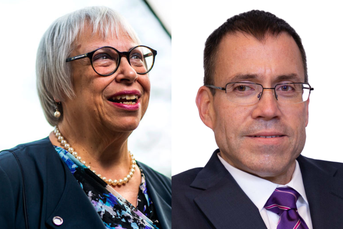Why more advisers are taking the free dinner seminar off the menu

A free meal can help win new clients, but some advisers say the prospecting strategy is dated and projects a bad image.
An old-school adviser marketing strategy — the free dinner seminar— was mostly put on ice during the pandemic, and some firms are now starting to offer them again.
Proponents of the strategy say that it can be a highly effective way to turn prospects into clients, even if attendees are there just for a free bite. But advisers in the other camp, especially those working predominantly with Gen X and millennials, call it a dated approach that is best forgotten.
And some adviser firms in the middle might be wondering what to do when the pandemic becomes history and there are no limits on capacity for dinners.
One firm, Daniel A. White & Associates, saw its registrations drop from a usual 30 to 50 per dinner to 15 or 20 during the pandemic, although people are now becoming more comfortable in larger crowds, and attendance is going up, said Tom Corner, the firm’s marketing manager and business development leader.
“We never stopped. We just had to adjust and continue to forge forward, because retirement doesn’t take a break — and there are more people we have seen have been forced into early retirement,” Corner said. The dinner seminar, “is actually very effective,” he said.
“It’s one of the most effective approaches we have to engage with prospects and eventually turn them into customers.”
The firm, which caters to retirees and near-retirees, hosts three or four events a week, in addition to daytime educational workshops at local colleges, he said.
The strategy is an added expense, but it pays off, he said.
“We get people who we think are there just for a meal. But because of what Dan has done to build his business … a lot of the time people end up being customers,” he said. “We’re focusing on a generation that is probably more used to going out to seminars.”
A quick internet search also shows that numerous other firms now offer dinner seminars.
Shurwest, a firm that provides marketing, practice management support and insurance services to advisers, has noted that dinners are a convenient way to attract clients, though it is important to get people to like you.
“The reason they come is the food. There may be some curiosity about you and your message, but they are all there for the dinner. That’s why you offer a meal; to attract people to your event,” a former client acquisition manager for the firm wrote in a blog post. “You are making it convenient for them to attend around dinner time. And, your main objective is to get them to like and trust you as soon as possible while you educate them.”
One company that was all but synonymous with dinner seminars, David Lerner Associates, currently shows no events scheduled on its website, although it still has a seminar section featured.
A FORMER STRATEGY
Adviser Nancy Hetrick’s firm, Smarter Financial Solutions, stopped holding dinner seminars around the 2008 financial crisis, she said in an email.
“In my opinion, it reeks of the old days and is in desperate need of modernizing. My firm is hosting a ‘Mastering Your Money’ women’s money club monthly for both clients and their invited guests,” Hetrick said. “We want to offer to be of service to our market, no strings attached, so they have a chance to get to know us, develop trust and understand how important it is to us to build true relationships. Dinner seminars need to be retired.”
Megan Kopka, of Kopka Financial, does not hold those events but has worked at companies that did, she said in an email.
“I think it cheapens our field. I teach at our local community college and sell courses online. If someone wants to learn they pay me for my professional approach not the other way around,” Kopka said. “When I was an adviser at Merrill Lynch, they called the attendees — those that didn’t buy — ‘plate lickers.’ There were many that came for just the free dinner, and they were labeled. I thought the whole thing to be a great way to educate, at least the first few years, and then a nightmare. I want clients that are looking for me, not that I market to, and I am busy enough making a good living without dining seminars.”
CHANGING PERCEPTIONS
Marketing strategies have increasingly gone digital, leaving little room for “old-fashioned” in-person dinners and mass-marketing events, said April Rudin, president of The Rudin Group.
“These dinners (and marketing tactics) smack of ‘Glengarry Glen Ross’ and gathering leads instead of the personalized approach that prospects and clients appreciate. I think that this approach is negative, and not effective,” Rudin said in an email.
“Instead, use a personalized approach to lead gen by using digital marketing and/or content marketing which can better target a demographic or audience that might be interested in learning more about you or a topic. Create a thoughtful newsletter and curate your email list to [centers of influence] or to prospects so that they can read at their leisure.”
For some advisers, seminar dinners are something they’ve never considered.
“People are smart, and they know that when they attend one of these dinner seminars, they will be sold on something — a service or a product. In our opinion, dinner seminars are the financial services version of a timeshare presentation,” said Michael Frick, president of Avalon Capital Advisors, in an email.
“We have found a much higher return on time and investment in reaching our potential clients through periodic online posts educating them on various topics of interest to them such as improving their cash flow, reducing their tax burden or planning for their retirement,” Frick said. “The number of potential clients we can reach through [social media] channels far exceeds the reach of a dinner seminar.”
Holding events at night can also put a burden on advisers.
“We never wanted to hold these as the evenings are a busy time for us with three little ones. Our niche is working with others in a similar situation. Invitations to attend a ‘retirement seminar’ are the first flyers in the recycling bin,” said Ashlee deSteiger, founder of Gunder Wealth Management, in an email. “On top of that, our clients want to hear about more strategic topics: Should I invest in crypto? Should I invest in real estate? Can you review my employee benefits? I’m self-employed — can you help me set up a retirement account?”
Hosting an annual dinner for existing clients can be a nice gesture, though trying to win new clients through that strategy is something Kashif Ahmed, president of American Private Wealth, said he will not consider.
“I can’t imagine enticing clients with a free meal (when we preach that there is no such thing as a free meal). And the ones that do show up, what does that tell you about them?” Ahmed said in an email. “Our clients’ events are for existing clients, never for prospects. And we typically do one a year … to say thank you.”
Learn more about reprints and licensing for this article.








